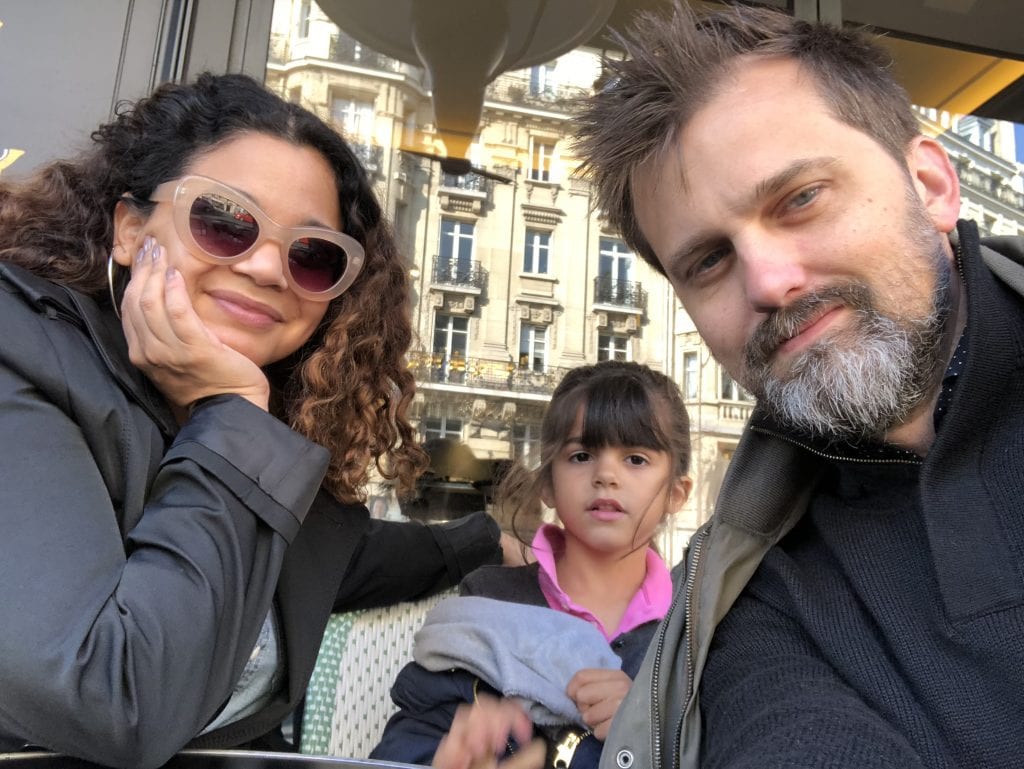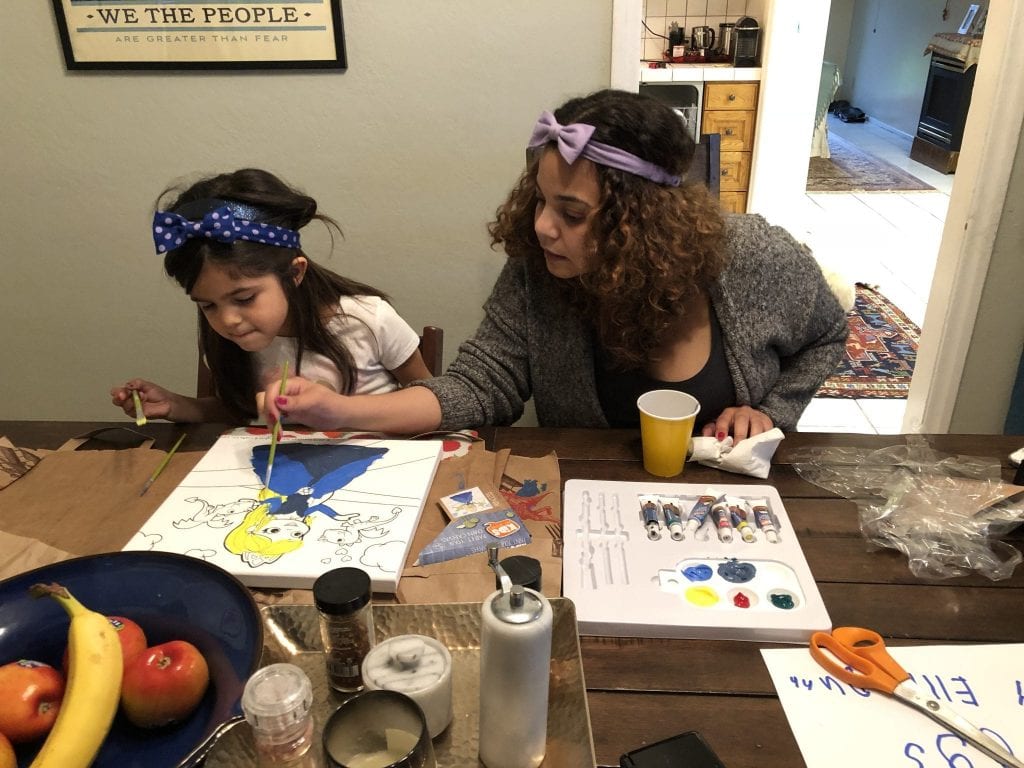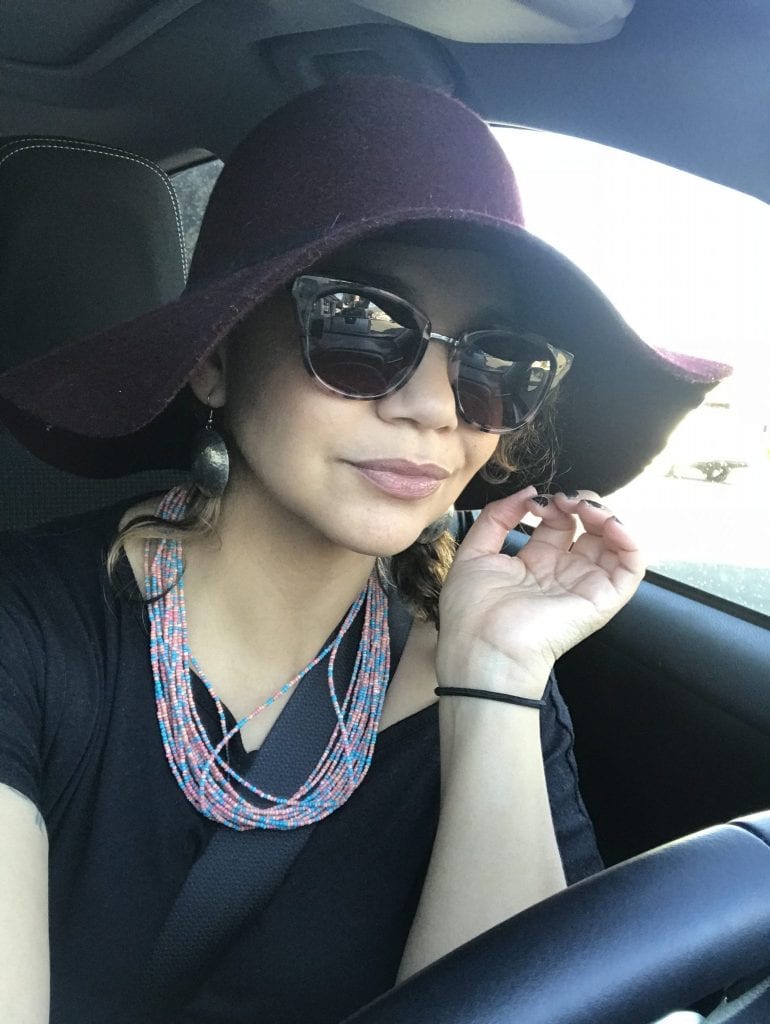
Yasmin Dunn, daughter Elizabeth and husband Jason, pictured here on a recent trip to Paris. PHOTOS COURTESY YASMIN DUNN
I was a reasonably healthy person up until my mid-20s. It was around age 26 that I started to feel as though something was off. I experienced a deep fatigue more appropriate for someone four times my age, had bizarre fainting spells and strange reactions to the sun. By my late 20s, I’d had a kidney biopsy, multiple gastroenterological tests and about five different diagnoses.
My bizarre symptoms came to a head after the birth of my daughter Elizabeth in August 2012. I was in a huge amount of pain, and the simple things that I’d looked forward to, like breastfeeding or even sleeping next to my baby, left me in tears. Every time her tiny hands reached out to touch me, I felt a shock of pain that radiated throughout my body and a deep fatigue that no amount of sleep could alleviate. After more tests and some unfortunate trial and error with medication, I was finally diagnosed with lupus in the spring of 2013.
Lupus is a chronic autoimmune disease that can damage any part of the body, including the skin, joints and organs. “Autoimmune” means your body attacks itself. “Chronic” means that symptoms come and go, but the disease never leaves you. Lupus manifests differently for everyone. For me, it means crushing fatigue after even minimal activity. Being in bright sunlight causes nausea and exhaustion, even if I’m only exposed for a moment. (You can imagine the fun of that particular symptom in L.A.) Fevers come and go regularly and sometimes keep me in bed for days when they are combined with severe joint pain.
There was relief in the diagnosis, but also a fair amount of fear. I wasn’t prepared for the reality of what it meant to be a lupus patient who is also a parent. However, I have learned a few things over the past five years. To make it easier for anyone struggling to parent and manage a chronic illness, I’ve gathered some of the most useful information from my experiences.
You are a superhero, but not the way you think.
Elizabeth loves “The Lego Batman Movie” Spoiler alert: By the end of the movie, Batman has to come to terms with the fact that he cannot work alone and that to truly do good in the world, he must work with others. This was a powerful message for me. I’m accustomed to doing things alone, but it is impossible to do it alone as a parent with a chronic illness. I’m privileged to have a job that allows me to work from home with my husband, so we’ve been able to work out a schedule, but it wasn’t always that easy.

Dunn and Elizabeth spend lots of time making crafts and doing art projects during summer, so that Dunn doesn’t spend as much time in the sun. PHOTO COURTESY YASMIN DUNN
When I was first diagnosed, I was working full time as a high school administrator. There was no way I could handle everything on my own, so I reached out to friends and family to help with my daughter. Sometimes, I asked them to come over in the evenings so I did not have to be on high alert with a toddler. Other times, I’d have friends come over so I could go to sleep early. My extended family helped out a lot, too, always willing to pitch in with babysitting or taking Elizabeth out for a walk or to a movie. I found that once I let go of the idea that I could do everything on my own, I became a better parent. Taking care of myself has to be my first priority, or I end up in bed for days, unable to do much of anything. Coordinating with friends and family to have an hour of rest can change everything. Asking for help and admitting I need it has never come easy for me, but if it’s good enough for Lego Batman, who am I to question?
If you are not lucky enough to be around family and friends, you might be able to find extra help by linking up with one of the many organizations in the area dedicated to helping those with various chronic illnesses. Lupus LA (lupusla.org) is a prominent local group, and program manager Katherine McMahon says it runs more than nine support groups in the L.A. area. Lupus LA offers scholarships of up to $500 to help cover healthcare costs. McMahon also referred me to a group called the California Chronic Care Coalition (CCCC, californiachroniccare.org), a resource for many different chronic illnesses with connections to local groups and information on navigating our complex healthcare system.
Letting go of guilt will let you have more fun with your child.
Chronic illness often brings with it some type of parenting guilt. My inability to do regular activities with my child is what is challenging for me. The sun is my nemesis. It causes flares, which for me means fevers, joint pain, bone-crushing fatigue and potential organ damage. So, when I see parents at the beach or the park (in the Valley, in the middle of summer) blissfully enjoying the sun with their kids, I feel like a failure.

Writer Yasmin Dunn, pictured here with daughter Elizabeth, finds meditation is one way to help manage her lupus and her parenting. PHOTO COURTESY YASMIN DUNN
I’ve learned to manage this particular guilt and realized that time with Elizabeth, no matter how I may perceive it, is the best thing I can give her. Every moment of our time doesn’t have to be Instagram and Pinterest worthy; it has to be authentic. I try to find exciting activities to do indoors during summer. For example, I found that having a lot of craft supplies available gives us a wonderful alternative to running around outside. I also keep a bin full of crayons and a 20-foot roll of craft paper on hand for creating posters and drawings. By no means are any of these supplies fancy or expensive. Most are from the dollar store.
Do your best to let go of whatever guilt your illness brings and focus instead on enjoying your child. Remember, too, that with some chronic illnesses, emotional stress can lead to flares and further complications. Take a deep breath and know that you are doing the best you can.
Yes, your kids can understand aspects of your illness.
It is important to talk with your children about your illness in an age-appropriate way, so that they understand what is going on and do not worry. “You have to be honest with your child,” says rheumatologist Elayne Garber, M.D., who, with her daughters, owns Garber Forbess Rheumatology in West L.A. “They understand a lot more than you think. At the same time, you have to reassure your child that you are their parent and will be there for them.”
Garber believes that it is important to normalize the symptoms of your illness for your children. “Explain that sometimes, but not always, you may feel more tired, like you have a cold, and during those times you may have to rest,” she says. I’m sure you’ve guessed that doctors also recommend resting and taking time for yourself. I’ve told Elizabeth that lupus is a cold that lives in my body and sometimes comes out. She understands that, as well as the fact that “Mommy is allergic to the sun.” It works for us.
Meditation and other self-care practices can make a big difference.
Meditation has become one of the main ways that I currently manage my illness and my parenting. I found a meditation center that has donation-based classes and began to attend once a week. Being in a meditation class allows me room to breathe, even if it is only for an hour. It’s not complicated. All I do is sit and breathe. The best part is that meditation is free and portable. I’ve been able to use this time to model for my family how to pause and breathe, which is essential to managing my illness.
I’ve also come to lean on acupuncture. Practitioner Polina Bowler, owner of East Meets West Holistic Center in the mid-Wilshire area, says that inflammation, poor circulation and fatigue are part of many chronic illnesses. She recommends a low-sugar diet that is full of as much organic produce as possible. Lucky for us, farmers markets abound in SoCal. Another of Bowler’s recommendations is common sense but really effective. “Enforce 30 minutes a day for yourself,” she urges. “Meditate, take a bath, read, have a cup of tea ….”
Finding low-impact ways to exercise will give you more energy.
One of the most frustrating things about many chronic illnesses is that exercise seems like the best and the worst thing for you. Many people struggle with establishing a regular exercise routine, and it’s even harder to do when you feel that crushing fatigue.

Dunn says that for those with chronic illness, “exercise seems like the best thing and the worst thing for you.” PHOTO COURTESY YASMIN DUNN
It’s worth the effort, though, because light to moderate low-impact exercise – under your doctor’s supervision – can help with all sorts of symptoms. Local personal trainer and wellness coach Grahm Baker, founder of A Better You Fitness & Martial Arts, suggests looking at exercise and healthy eating as preventative medicine. “Daily exercise strengthens our immune system, improves sleep, creates a daily sense of accomplishment, reduces inflammation, lowers blood pressure, strengthens our heart, muscles, bones and much more,” he says.
It is also a twofer because, if you do it right, you get time to yourself as well. For me, group fitness classes offer another bonus, as I tend to isolate. I’ve been lucky enough to discover great low-impact barre classes through the fitness chain Pure Barre (purebarre.com). Many low-impact classes are offered at the YMCA or through local parks and recreation departments. Doctors also suggest swimming, which can be complicated with a sun allergy, but a surprising number of public pools are indoors.
Mostly, I’ve learned to just take a break when I need to, which is hard, especially in a place like L.A. This city is so vibrant and energized. But as parents, we have to learn to parent ourselves and follow the loving advice we’d give to our kids, so that we can keep our chronic illnesses in check while also caring for our families.
Yasmin Dunn, a native Angeleno, is a visual effects producer and freelance writer. She lives with her husband, daughter and two dogs, Moxie and Tommy Lasorda, in Burbank.


























